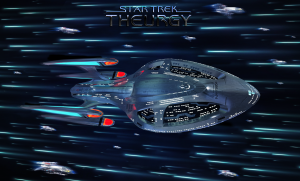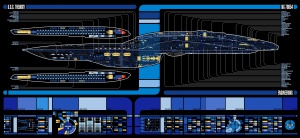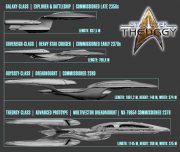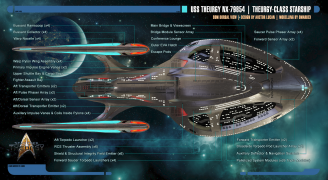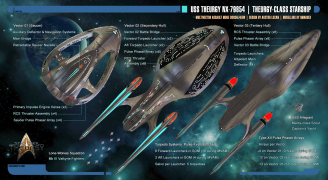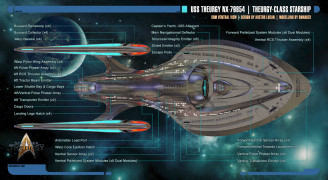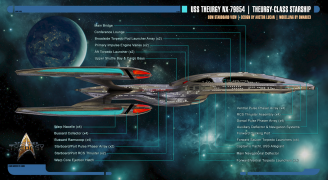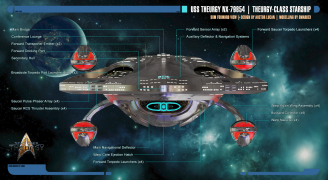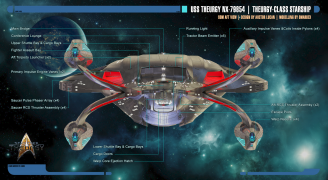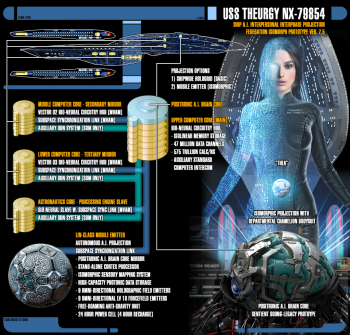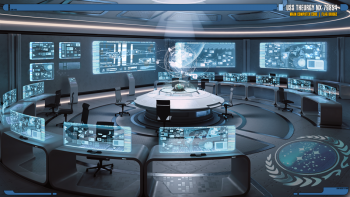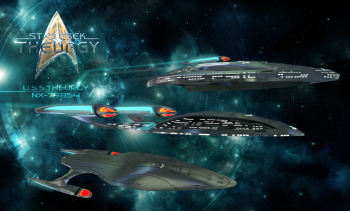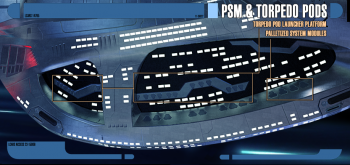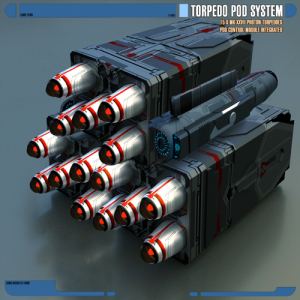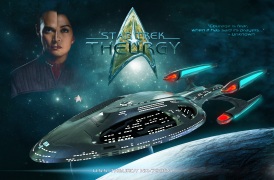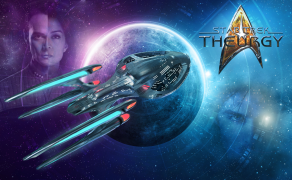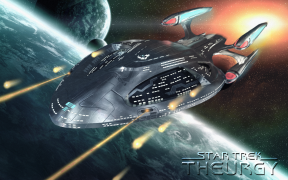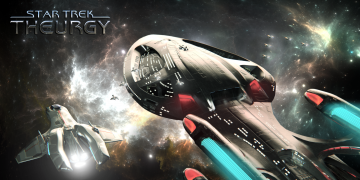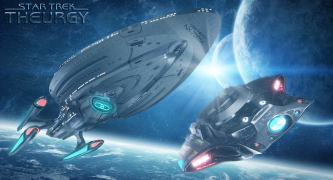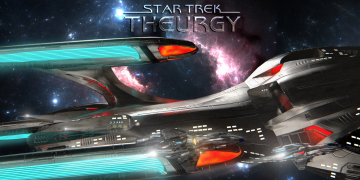USS Theurgy: Difference between revisions
From Star Trek: Theurgy Wiki
m (Minor style updates) |
m (Spelling corrections) |
||
| Line 102: | Line 102: | ||
=== Hijacking === | === Hijacking === | ||
In early november 2380, after returning to base in San Francisco after a long diplomatic mission to Romulus, the senior staff of the USS Theurgy was involved in an attempt to overthrow Starfleet Command. Forced to leave Earth, Captain | In early november 2380, after returning to base in San Francisco after a long diplomatic mission to Romulus, the senior staff of the USS Theurgy was involved in an attempt to overthrow Starfleet Command. Forced to leave Earth, Captain Jien Ives hijacked the Theurgy and defected, alongside his entire crew, to the Romulans. All attempts by Starfleet to apprehend the ship and its crew have thus far been unsuccessful. The whereabouts of the USS Theurgy are unknown at this time. | ||
==Physical Arrangement== | ==Physical Arrangement== | ||
Revision as of 09:23, 13 May 2016
The USS Theurgy (NX-79854) was the prototype of the Theurgy-class of Federation Starfleet starships launched in the 24th Century.
History
Construction and launch
An experimental prototype, designed for long-range exploration, diplomacy, and deterrence; the Theurgy is a Multi vector Dreadnought. It was built in a joint venture between the Antares Shipyards and Utopia Planitia Fleet Yards before being commissioned on October 9th, 2378. The USS Theurgy is one of the most advanced Starfleet vessels ever constructed and is meant to be the pinnacle of starship design, destined to carry the Federation into a new generation of exploration in the next century.
Devised to work far from a starbase or other Starfleet facilities, the Theurgy-class has expanded science laboratories and ample room for cargo or passengers. It is highly capable of rescue missions or civilian evacuations in war zones when taken to mass-production. Defensively, it has regenerative shielding, ablative armour and multivector assault mode (MVAM) - in which the ship is able to attack enemies from three different directions simultaneously. It is one of the largest starships ever created by Starfleet, surpassing even the Odyssey-class in size.
Officially, both the Odyssey and the Theurgy-classes were rushed into production because of the Romulan Civil War. Unofficially, there are those who believe Starfleet Command pushed the production ahead of schedule for sake of their own agenda.
Hijacking
In early november 2380, after returning to base in San Francisco after a long diplomatic mission to Romulus, the senior staff of the USS Theurgy was involved in an attempt to overthrow Starfleet Command. Forced to leave Earth, Captain Jien Ives hijacked the Theurgy and defected, alongside his entire crew, to the Romulans. All attempts by Starfleet to apprehend the ship and its crew have thus far been unsuccessful. The whereabouts of the USS Theurgy are unknown at this time.
Physical Arrangement
The Theurgy-Class shared similar design characteristics with the smaller Odyssey and Prometheus class starships. The design included three hull sections, each which could be reversibly separated: an arrowhead-shaped primary hull, a detachable secondary hull equipped with a fighter bay, and a deployable tertiary hull housing the primary warp engines. All three sections were equipped with independent warp-capable flight and combat capabilities in the multi-vector assault mode. While other starship classes had similar capabilities, such as the Galaxy-class with its saucer separation feature, generally the saucer section of such classes had no warp drive and limited weaponry.
Theurgy-class (Dorsal View)
Theurgy-class (Dorsal MVAM View)
Theurgy-class (Ventral View)
Theurgy-class (StarboardView)
- THEURGY-CLASS-MVAM-STARBOARD.png
Theurgy-class (Starboard MVAM View)
Theurgy-class (Forward View)
Theurgy-class (Aft View)
Deck Layout
| Deck | Primary Hull | Secondary Hull | Tertiary Hull |
| Deck 1 |
|
||
| Deck 2 |
| ||
| Deck 3 |
| ||
| Deck 4 |
| ||
| Deck 5 |
| ||
| Deck 6 |
|
| |
| Deck 7 |
|
| |
| Deck 8 |
|
| |
| Deck 9 |
|
| |
| Deck 10 |
| ||
| Deck 11 |
|
|
|
| Deck 12 |
|
| |
| Deck 13 |
|
| |
| Deck 14 |
|
| |
| Deck 15 |
|
| |
| Deck 16 |
|
|
|
| Deck 17 | |||
| Deck 18 | |||
| Deck 19 |
| ||
| Deck 20 |
| ||
| Deck 21 |
| ||
| Deck 22 |
| ||
| Deck 23 |
| ||
| Deck 24 |
| ||
| Deck 25 |
| ||
| Deck 26 |
| ||
| Deck 27 | |||
| Deck 28 |
| ||
| Deck 29 | |||
| Deck 30 |
| ||
| Deck 31 |
| ||
| Deck 32 |
|
Command and Control Systems
Main Bridge
The main bridge of the Theurgy-class was circular with an extended section to the rear and served as a nerve centre of the vessel.
At the rear of the Bridge was a large console and data readout screens. Centre of that area was the Master Systems Display. In front of the information centre was a free standing console, which served as Missions ops. The Missions Ops console was operated by either the Executive Officer or a member of the Operations Team, and was used to co-ordinate all activities within the current missions parameters. It was usually where flight operations for the Theurgy’s compliment of Valkyrie fighters are organised.
Starboard of the information centre, past the doorway to the Captain’s Ready Room, was the station of the chief tactical officer. This area was maintained mostly for internal security and combat situations. Other systems that could be commanded by tactical included long- and short-range sensor arrays, sensor probes, message buoys, and tractor beams. An identical station was found on the other side of the bridge, which seated the chief engineer. Though the position was far better served in main engineering, situations arose where the engineer's presence was needed on the bridge. The console allowed complete control over all engineering and environmental systems.
Forward of the rear bridge operation areas were doorways to the starboard turbolift and port security checkpoint. The security checkpoint allowed security officers to screen those entering the bridge, either directly from Deck 1 or via Turbolifts, with the ability to redirect the latter as required. It also provided a defendable area and held an armoury for handheld weapons.
In the center of the Theurgy-class' bridge was the command area. Here, seating was provided for the vessel's commanding officer and his or her first officer, seated to the captain's left. Between these chairs was a miniaturized status display. Using keyboard or vocal commands, the commanding officer could use these controls to override the basic operation of the starship. Directly aft of this area, integrated in the handrail encircling the aft section of the central command area, was another command console that could be operated to perform more bridge duties.
Directly forward of and two steps lower than the central command area were the conn and ops stations. From here, the flight control officer served as helmsman and navigator for the starship. Despite many of these functions being heavily automated, their critical nature demanded a humanoid officer to oversee these operations at all times. During spaceflight at impulse, conn monitored relativistic effects as well as inertial damping system status. When the ship was traveling at warp speed, conn monitored the subspace field geometry in parallel with the engineering department. During warp flight, the conn console continually updated long-range sensor data and made automatic course corrections to adjust for minor variations in the density of the interstellar medium. In this area, the Operations station presented the operations officer with a continually updated list of current major shipboard activities. This list permitted Ops to set priorities and allocate resources among current operations. This was especially critical when two or more requests required the use of the same equipment, entailed mutually exclusive mission profiles, or involved some unusual safety or tactical considerations.
Flanked to the both sides of conn sat the science staff. Two rows of science consoles allowed science staff direct access to data from the numerous science laboratories aboard Theurgy as well as the deflector and sensor arrays.
Battle bridges
Based on Deck 8 in the Secondary Vector and Deck 11 in the Teritary Vector, the USS Theurgy has two battle bridges. These are smaller than the main bridge and are designed to operate independently as required when in Multi-Vector Assault Mode.
Computer systems and A.I.
The computer system on board the Theurgy-class was mixture of isolinear and bioneural based processing. Computer systems were concentrated in a computer core, which was accessible through a maintenance room. Each Theurgy-class vessel carried a total of four independent computer cores; one located in the primary vector, one in the secondary vector and two in the tertiary vector. The top level of the Primary Computer core provided the space for the hardware of the vessels A.I.
Thea A.I. Overview
After the USS Voyager returned to the Alpha Quadrant in the year 2378, and the EMH Mk.1 became renowned for its development from a mere emergency hologram to an individual considered sentient (even earning the publishing right to its own holonovel series), another - classified - old project of Starfleet earned a lot of new interest.
Twenty-six years earlier, huge amounts of funding had begun in the development of a rudimentary idea involving a Ship AI, and as a side-project to this was also the outline of a holographic interface for this A.I. The term 'artificial intelligence' (or computer intelligence) had always described prototype computer hardware and software sophisticated enough to reason independently, to form new conclusions and alter its own responses. By the time, the technology was no longer impossible. The idea was that while the A.I. would be limited in its accessibility to ship systems, it would still serve as well as any crew member - possessing first-hand knowledge about the vessel it was installed into.
As time passed, the project caught the eye of non-scientists, became a political debate, and while it was the Daystrom Institute's hope that the Ship A.I. would inspire an entirely new generation of artificial intelligences capable of far more than anyone could have previously imagined, many began to concern themselves with the independent nature of living artificial intelligences installed and adapting themselves aboard torpedo-carrying starships. While the developers thought that the benefits of making a starship an essential part of its crew far outweighed the possible negative scenarios, Starfleet as a whole could not reach consensus. The solution was a set-back for the A.I. development for sake of preserving the comfortable safety of the common standard computer integrity.
Besides the software programming, an extensive amount of hard-wiring had to be done to a Starship in order to keep the software from being able to access certain key systems. Long and heated debates coursed over the matter of what an AI was supposed to be able to affect or not, and what manner of prerequisites were needed to alter the interphase projection's accessibility and actions. Moreover, the projection itself needed "physical"accessibility to the whole ship, and therefore required a huge amount of holo-emitters on all decks.
Subroutines would often account for the sentient qualities of A.I. and this debated Ship A.I. project was no exception. Subroutine C-47 was and still is a section of the software in each Starship's computer responsible for non-critical systems such as replicator selections and recreational programming, and all that had to function without hampering the sentience of the interactive projection. An activation subroutine was also needed to be ironed out; a standard set of procedures that were required to be followed prior to the summoning of the projection. Furthermore, a modesty subroutine was added in response to the evident fact that the hologram would not feel it was necessary to wear clothing because it would neither suffer for the elements nor leave its own "body/ship" so to speak. Sufficed to say, the magnitude of the project escalated every day. The subroutines piled up, and added with the millions of other functions of the Starship itself, it seemed it would become too much data to handle.
Though with the advancement in Android sciences at the Daystrom Institute, based on an advanced neural-net design of Noonien Soong and the technology of a pasitronic brain, the vague idea of a solution took form. This however, was the point where the Dominion War broke out, and the enterprise was no more a priority.
Yet with the aforementioned return of the USS Voyager, the project received its due attention once again, and the concept of incorporating a pasitronic brain into the main computer core of a starship was given its proper chance of implementation. This, with the evolving Prometheus project that was about to be finalised. Moreover, the Emergency Command Hologram (ECH), was an extension of the USS Voyager's EHM and proves essential in the development process. The program was implemented by Captain Kathryn Janeway on Voyager and would serve as a , 'backup captain', in the event of the current command crew being incapacitated. The ECH possessed information from all major Starfleet strategic and tactical databases and could incorporate them into its plans for controlling the ship. Equally so, would the Ship A.I. Interphase Projection possess such a command subroutines.
All the pieces of the puzzle had been uncovered, and with the blessing of Starfleet Command, results came fast. The USS Theurgy was one of the first ships to be commissioned, and it was picked for the Ship A.I. implementation.
The Daystrom Institute installed the A.I:s primary matrix in the pasitronic brain within the computer core of the USS Thuergy itself. Without propulsion or tactical systems yet installed, the embryo that was the A.I:s program could branch out and connect to every corner of the Theurgy's mainframe. In the beginning, there were of course huge amounts of cascade failure - occurring when a "learning" program was corrupted either by repeated application to a task it is ill suited to perform or by external influence such as inferior hardware used to implement it. In a neural net system, in particular a positronic brain, in which most or all sub-programs interacted, this led to corruption of surrounding algorithms and routines as they attempted to use data generated by the faulty application to perform a task of their own.
Yet in the end the Daystrom Institute and hundreds of civilian programmers on the Federation's payroll managed it all with version 7.5. Their continued efforts with the stabilized version gained great results, increasing overall efficiency, but also helping the A.I. to become more of a... person. The result was Thea, as she began to call herself instead of Theurgy NX-79854, a woman who had the benefit of the complete attention of the fleet's finest Counsellors in order for her to come to terms with her existence. Throughout the year 2378 and 2379, she evolved from a simple yet highly dynamic ship's artificial intelligence into what came to be seen as the Theurgy's personality and guardian spirit.
In terms of functionality, she was flawless - tested and re-tested in all kinds of battle and non-battle situations. The Federation would never launch a prototype Starship with an AI installed unless it had been thoroughly tested, after all.
Early in the year 2381, Holographic Specialist Lin Kae developed a mobile emitter for Thea, with superior sensory mapping and giving her the ability to leave "herself" and go on away-missions.
Flag Bridge
A flag bridge is a dedicated facility to command a formation of ships, independent of the ship it's on. If the Theurgy had not been an outlaw ship, this is where admirals would work from at the front lines. The admirals would have their own "flag bridge crew" to manage to overall situation, from ships' statuses and the overall space around them. They would be independent of Theurgy's crew proper and not involved at all in her operation between sending directions from the admiral and receiving reports.
Propulsion Systems
When in standard operating mode, Theurgy-class ships achieved warp flight through four nacelles, each of which are made up of multiple pairs of warp coils. They were in turn powered by a warp core, which at the centre, provided energy through a matter-antimatter reaction. The assembly for such was housed in Main Engineering.
Main engineering
Main engineering aboard a Theurgy-class starship was located on deck 25. The room was constructed around a class 9 warp drive with a tricyclic input manifold. The core provided a maximum output of four thousand teradynes per second. The warp drive was designed to operate for up to three years before refueling. The reaction chamber was equipped with a compositor, which allowed recrystallization of dilithium. The warp drive allowed the ship a top sustainable cruise velocity of warp factor 9.995. The Intrepid-class also featured two secondary warp assemblies.
The secondary warp assemblies were housed with the primary and secondary vector, and allowed each hull of the ship to enter warp independently in MVAM. During standard operation mode, these cores idle, providing additional power to subsystems across the vessel.
The main engineering room featured three levels. In front of the warp core was a large monitoring area on the lower engineering level. Also located on this level is the chief engineer's office and an open work area for special projects or situational analysis.
The main impulse engines on an Therugy-class starship were located on the aft primary hull. Each of the pylons leading to the warp nacelles held auxiliary impulse engines. Theurgy-class starships were also equipped with auxiliary impulse reactors.
Warp core ejection
In the event of a warp core breach, the Therugy-class starship could eject the warp core. This procedure required the authorization code of the chief engineer or a member of the senior staff. The core was ejected through the ejection port on the hull. Magnetic rails inside the channel accelerated the core once disengaged from the vessel and fired it away from the ship. Under normal circumstances, the vessel then moved away from the core as fast as possible under impulse power.
Should the core not go critical, the vessel could recover it with tractor beams and reintegrate it with careful manipulation.
Scientific Systems
A Theurgy-class starship houses over one hundred separate scientific research labs. Very few of the research labs remained under the same discipline of science for more than six months. Most shared the same design; only a few had extremely specialized equipment.
Stellar cartography
While most laboratories are shared, Theurgy-class vessels have specific stellar cartography facilities on Deck 15. Based in a large cylindrical room, the walls of the room were designed to be a three-dimensional display and spans two decks.
Arboretum
The arboretum was a triple deck room capable of studying and supporting a wide variety of plant life, and also doubled as a social area.
Tactical Systems
MVAM – Multi Vector Assault Mode
The Theurgy spends the vast majority of its life in Standard Operating Mode (SOM). Multivector Assault Mode - where the ship is divided into three parts - is typically reserved for battle situations. All hulls - or "Vectors" - are Warp capable, and thus MVAM can be engaged during warp. This was an original design that had been scraped, since due to the separation of the vessel, each section was only one-third the power of the whole ship.
To solve this, the warp core arrangement was unique. The efficiency of a warp core is in part dependant on its height - the longer a core is, the more accurately the matter and antimatter streams could be controlled. To overcome this, the main warp core has no less than three reaction chambers along its height. During normal operation, matter is fed in at the top of the core and antimatter at the bottom, as in any normal warp core. The fuel streams pass directly through the upper and lower reaction chambers and continue down to their meeting point in the middle chamber. The core thus operates in a manner similar to any standard model, achieving high efficiency through the long core design. The central reaction chamber lies just above the separation plane between Vector 02 and 03, and once the ship splits, it is shut down. The remaining reaction chambers are fed antimatter and deuterium respectively through auxiliary channels. A Battle Bridge and computer cores on each hull of the vessel allowed the section to perform more adequately, plus the addition of multiple Sickbays to treat the wounded.
If the ship encountered a battle situation, the Commanding Officer may choose to activate Multivector Assault Mode. Then, the ship splits into three independent sections, all of which have warp capability and a powerful weapons load-out. Additionally, the ship's Main Bridge is on Deck 01 in the Saucer section (Vector 01). Vector 02 and 03 have Battle Bridges that can be fully crewed during MVAM if the Commanding Officer does not chose computer control from Vector 01. One additional item of interest: nearly a third of the ship's weaponry is hidden during SOM and only becomes available during MVAM.
Pulse Phaser Arrays
The Theurgy-class utilized a ship-mounted pulse phaser array system. The pulse phaser arrays were similar to Phaser Cannon assemblies on defiant-class starships, but were tuned to allow an great arc of fire like conventional phaser beam emitters.
Torpedo Pod Launcher Arrays (TPLA)
Since the Dominion War, Starfleet has been seeking options for engagement in the traditional torpedo gunnery blind spots along a ship's sides, as well as ways to provide a heavy enough long-range punch at a rate that could effectively saturate a target's defences, which would need to be a faster rate of launch than could be accomplished with individual torpedo tubes. As such, torpedo pods and their associated launchers were developed.
As a result of this requirement, Starfleet Tactical R&D developed reusable pods carrying a number of torpedoes and an on-board power supply, launching mechanism, computer and control system, which are fed their targeting information from the launching ship or as the capability becomes available, from Pod Control Modules (part of Starfleet's Palletized Systems Module, or PSM, program). However, despite the wish of some within Starfleet Tactical R&D, it was determined that using all-up main-tube torpedoes, or even the Mk XXVII Intermediate Torpedo, in the pods would be impractical. Indeed, the mass and volume of the larger warheads would prove unmanageable within the pods themselves as it would be impossible to mount linear accelerators large enough to reach meaningful launch velocities; another deciding factor has to do with the limited magazine space within starships as there simply is not enough available internal volume to carry sufficient numbers of loose torpedoes to refill the pods with. As such, the pods are designed to house and launch 15 of the same Type V micro-torpedoes as carried internally in the Valkyrie-class fighter and the sheer volume of fire in each pod was deemed an acceptable tradeoff for the much smaller individual warheads.
But what makes pods most attractive is that they do not necessarily have to be activated and fired as soon as they are launched. A ship could lay a pattern of pods and fire several of them at once (up to its maximum control capacity) into a massive salvo. And given pods' extremely stealthy nature in their low-powered standby mode and their lack of immediately apparent signature when being deployed, a vessel could even lay several patterns and either launch a number of massive salvos or maintain a steady stream of fire for an extended duration in "ripple fire", reallocating fire control and telemetry links to a fresh pod after one has been fired.
However, only a pod-laying ship has the on-board facilities to quickly reload and recondition a pod for launch after recovery. On others, once a pod has been recovered each tube must be individually reloaded and its covers replaced before the computer can be flashed and its battery replaced.
However, pods are unarmoured and unshielded and as such are extremely vulnerable to enemy fire and collateral damage, and when actively engaged, an officer commanding a pod-equipped ship has to decide whether he would rather risk laying a larger pattern with a heavier salvo at the risk of his pods being damaged or destroyed before he can fire them, or launching individual pods and flushing them immediately, sacrificing weight of fire for any given salvo for the knowledge that he will not lose any full pod to enemy fire or proximity damage.
At this point in time, only a handful of ships in Starfleet are considered to be true pod-layers, with the Theurgy being the only one to have been intended from the keel-up with that particular capability. A few have been refitted to that status, and all of them have been attached to Admiral Sankolov for the time being.
However, any starship can make use of them, keeping them internally in their shuttle bays or any external cargo hold with a large enough door to fit them. Or even having them attached to their outer hull using magnetic grapples, although such would change its hull profile, which in turn would affect the efficiency of its warp field and lower its maximum speed. Another disadvantage has to do with a pod's inherent fragility and should a hit come through and strike the pod, there is a chance the weapons may explode with catastrophic implication for the ship to which the pod is in contact with. Also, ships that have not been designed or refitted as pod-layers lack the telemetry capability to lay and control more than small patterns, the size of which is dependent on the ship's individual capabilities.
That problem will eventually be alleviated with the issue of of Pod Control Modules, which were designed to give ships that are not designed or refitted to serve as purpose-intended pod launching platforms, yet expected to carry or control pods for a specific mission, the capability to control salvos of meaningful weight. Each PCM can control up to 18 pods at a time. However, such modules were unavailable when the intended test bed platform, the USS Theurgy, was commissioned and the alternate test bed, the Archeron, was deployed before they could be sent. However, there are 4 such pallets forward-deployed to a classified location near the Romulan Neutral Zone.
Sequence of engagement with pods:
- Mother ship drops her pods (individual launch or laying patterns) OR
- Targets are acquired and telemetry links are established to pods
- Torpedoes are launched from pods
- If applicable, control links are shifted to unused pods
- Repeat as required
- Spent and/or unused pods are recovered for reconditioning and re-loading
Alternatively, a dedicated pod-launching vessel may fire the pods directly from its launchers and the empty pod will be flushed into space for later recovery. The trade-off to the higher rate of fire so achieved is a lesser salvo weight. Another alternative, depending on the tactical situation, is for the crew that man the broadside launcher arrays to keep the pods in place, close the array, and restock the pods inside the ship, but would entail 2 minutes of reloading for each pod.
Crew Support Systems
Medical facilities
Sickbay
Sickbay is an old Navy term for "ship's hospital", which in continued even into the 24th Century. Here we will discuss the various parts of the USS Theurgy Sickbay.
- Number of Primary Care Biobeds: 12
- Number of Intensive Care Biobeds: 8
- Number of Recovery Beds: 12
- Number of Surgical Beds: 2
- Number of Isolation Units: 2
- Number of Decontamination Chambers: 2
- Number of Medical Replicators: 7 (1 for each area except for the morgue)
Recovery Ward
Pretty much where you'll end up if your illness or injury is not too life-threatening but the doctor requires you to hang around overnight for treatment and/or monitoring. Also is where non-critical patients are placed after surgery. Includes 12 biobeds with overhead monitors, sanitized pillows and sheets for each bed, 1 replicator, and supply storage cabinet close by.
Primary Care Unit [PCU]
This is most likely where you'd be treated for bumps, bruises, common diseases, and anything else that doesn't look to be particularly life-threatening. Includes 12 scanning biobeds.
Intensive Care Unit [ICU]
Here's where you go if the doctors aren't sure whether you'll die soon or not and there's little more they can do about it but watch and wait. Each biobed is rigged for constant 3-dimensional scanning and monitoring of the patient. Includes computer link-up to an adjustable "Code Blue" alarm system that sounds the instant a patient's life-signs fall out of acceptable parameters. Also includes 1 replicator, additional life support hardware for each bed, back-up battery power on a separate power grid from the ship, atmospheric isolation systems, and a supply storage closet can be found near by.
Medlabs
The primary laboratory for Sickbay's use. Includes 1 replicator, material diagnostics stations, a centrifuge, gene analysis terminal, a table for post-mortum examinations, and stasis field drawers for storage of biological samples, corpses or patients requiring treatment not available on the ship. [Also Medlab 02]
Surgical Suites
If you need surgery to save your life, correct an illness, fix a serious injury, or to just have yourself cosmetically altered for an undercover assignment this is where they'll have you laid out. Along with the usual surgical tools the room includes mobile life support equipment, a replicator, atmospheric isolation systems, and scanning/monitoring readout station.
Holographic Projection Grid
Two EMH programs are currently available, the longer term Mark II and the short term Mark I. Developed to act as the Chief Medical Officer as and when required, these programs can also be activated to provide additional assistance to the real Chief Medical Officer. the EMH are programmed with all current medical knowledge and has the ability to learn as required. Additionally the EMH can take on any other medical role as required by the ship/facility.
Unlike previous EMH systems with primary emitters inset into ceiling every 1.5 meters and larger back-up emitters inset into centre of each ceiling over the Recovery Ward, Primary Care Unit, Medlab-1, and both operating rooms being fully integrated with Sickbay's computer hardware to prevent accidental loss of the EMH at critical moments, the Theurgy-class takes the EMH one step further, having holo-emitters in every area of the ship, allowing the good doctors to venture outside of Sickbay to treat the wounded more efficiently just like the Ship AI Hologram.
Battle Sickbays
Because of the Theurgy's MVAM-mode, many main areas of the ship have been duplicated, this includes the Sickbay. Vector 01 and 03 sections both contain a full Sickbay. Vector 02's Sickbay (the saucer section) is the Main Sickbay area [discussed above], while the other two Vectors have one Battle Sickbay each. These are much larger than the Main Sickbay, and with its open layout that gives the medical personnel more freedom of moment, it is designed specifically for battle conditions.
Morgue
A morgue facility with storage slots for several bodies was located adjacent to sickbay.
Counselor's office
The ship's counselor had their own office, located on Deck 9. Crew members needing emotional support could meet in private with the counselor here.
Crew quarters
Most crew quarters on the Theurgy-class were located in the ship's saucer section, in order to provide safety for civilian and non-essential personnel during a saucer separation. However, the engineering hull also contained crew quarters, generally containing engineering personnel.
There were several types of quarters aboard:
- Standard crew quarters: These small quarters units were located within the primary and secondary hulls and lack windows. They included a living area, a bedroom, and a bathroom. Crewmembers of lieutenant junior grade were given their own quarters; ensigns and crewmen were required to share their quarters (except for senior officers). The living area contained a replicator terminal and was customizable with a variety of furniture and decorations.
- Officers' quarters: These quarters lined the edge of the primary vector and contained a living area, a bedroom, and a bathroom area. They were generally reserved for those of ranking lieutenant or higher. Members of the senior staff were typically assigned quarters featuring a pair of larger, wider windows.
- Captain's quarters: The captain's quarters, located on deck 10, were similar to the officers' quarters but were slightly larger. The captain had a large desk area and work terminal. His or her quarters featured five windows which offered an excellent view of space in front of the vessel.
Recreational facilities
Below Decks Lounge
Located in the tertiary hull on Deck 28, Below Decks served as the social center of the ship. It had a battery of recreational games including three-dimensional chess as well as a fully stocked bar which carried syntheholic beverages. The replicators were also able to produce other food and drinks for the crew to enjoy in a relaxed social setting.
Holodecks
There were eight holodecks aboard the ship. These holodecks were proprietary Federation technology and could comfortably support fifteen people at a time. The holodecks of used a more efficient implementation of replicator technology to reduce power consumption when operational. This was achieved by using replicator technology to create static objects, which required no additional energy to maintain. Standard holo-emitter technology was used for dynamic objects. This allowed for continued use even when energy supplies were low, differing from those installed on earlier vessels, including the USS Enterprise-D, on which holodecks were automatically shut down when ships' energy dropped below safe levels.
Phaser range
The phaser range was located on Deck 21. A person stood on a platform in the center of the room, illuminated only by the light which came from above the platform. Colored circular lights, approximately the size of a Human hand, whirled across the walls, and the person aimed and fired at selected targets. After completing a round, the number of hits and misses, along with the percentage of accuracy, were tallied by the ship's computer. There were at least fifteen levels of difficulty, and the range could be customized for two-player competition.
The phaser range was also used by security officers to train personnel in marksmanship.
Gymnasium
The gymnasium, which was also on Deck 12, contained a variety of recreational equipment for a variety of sports. In addition to aerobic studios and martial arts areas, there was a parrises squares area, a squash court, a fencing room, and an anbo-jytsu court.
Auxiliary and Spacecraft Systems
Palletized System Modules (PSM)
Even after the number of recent conflicts, Starfleet's use of combat-centric vessels such as the Defiant and Prometheus classes remains a controversial issue. And even after the Prometheus-class project proved to be a viable option, purpose-designed warships remain unpopular and Starfleet has been looking for ways to keep ships intended for battle in service without diluting their tactical potential by stripping away capabilities. And, at the same time, Starfleet Tactical was seeking out ways to improve any vessel's combat potential without the need to build new hulls.
And when both requirements collided, the Palletized System Modules (PSM) program was born. The concept is rather simple, and quite similar to the plug-and-play capability enabled by USB ports in the early 21st century. A ship with PSM capability would have, under removable hull panels, universal connectors that would provide power and control linkages to to an standard-sized module which would provide additional capability to its host vessel. The installation process for any module is rather simple: the external hull panel is removed and then stowed into a cargo bay or other facility, and either with the use of an auxiliary craft or an EVA the module is brought to its location and it is secured in place using maglocks and physical clamps.
As it stands, only the Theurgy-class prototype has been designed from the keel up for this capability, but several ships including the USS Archeron and a handful of vessels in her task force have been refitted for it. While building a new class that is intended to receive this capability is fairly easy, the refit process requires Starfleet engineers to readjust a ship's power budget, often involving changing its power plants altogether, in order to ensure every system can run properly. This is one reason that when she was first designed, critics referred to the Theurgy-class as being over-powered and over-engineered, despite the fact that her hull can accommodate up to X additional pallets between her three vectors.
However, the PSM is intended to be a staple of future ship design, and theories surrounding the building of entirely modular starships are being explored at this time.
Pallet Options
- Sensor (broad-spectrum or specialized)
- Communications, Command and Control (for ships that are not inherently flagships but could serve in that role)
- Pod Control Modules (Only four have been produced so far and have been forward-deployed to a classified location near the RMZ)
- Palletized Point Defence Modules
- External Machinery Points
- External Gantry Systems (ie: for repair ships)
- Additional Shield Emitters
- Additional Tractor Beams
- Etc.
Transport and cargo
Transporter rooms
The Theurgy-class featured transporter facilities which utilized bio-neural gel packs in their processor systems. In case of emergencies, injured personnel could be directly transported to sickbay from anywhere in transporter range, including inside the ship.
Like many Federation starships, the Theurgy-class' transporters had six standard pads located in front of a control console. Here the transporter controls were located in an elevated booth, and two officers could operate them in conjunction with a wall panel for more complicated transports.
Cargo bays
There were numerous multi-level cargo bays located all throughout the ship. Most of these bays contained sufficient room for storage, cargo transporters, and anti-grav units for the transportation of cargo.
Spacecraft Systems
Shuttlebays
There were two shuttlebays aboard a Theurgy -class starship, supporting many varieties of shuttlecraft. The main shuttlebay was located on Deck 11 in the primary hull.
Fighter Bay
The Fighter Assault Bay (more commonly called the Flight Hangar, the hangar etc.) was the area in which the Tactical CONN squadron of Mk III Valkyries are housed and where the Theurgy's fighter pilots usually hang out.
Captain’s Yacht
The Yacht, located on Deck 19, like many of the other things stationed on the USS Theurgy, is an experimental prototype. It was an augmented version of the Talon-class scout, only refereed to as Project Manta by the Advanced Starship Design Bureau, and embedded into the Theurgy's hull as a Captains Yacht.
Crew
Commanding Officers
- Captain Jean Ives (2378 – present)
Command Crew
- Executive Officer
- Commander Nerina (2381)
- Commander Edena Rex (2381)
- Commander Carrigan Trent (2381 - Present)
- Second Officer
